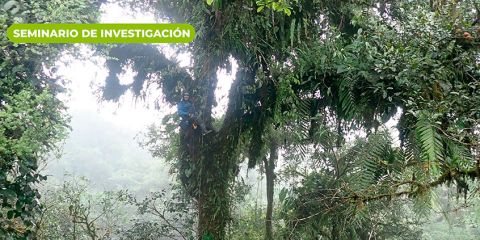
Drivers of plant community assembly in temperate and tropical forest canopies
A fundamental challenge in ecology is understanding the assembly of diverse communities. Both abiotic habitat filtering (e.g, light) and biotic interactions (e.g., competition) likely contribute to compositional turnover, but these processes are rarely tested simultaneously. Epiphytes (i.e., plants that live non-parasitically on other plants) offer a unique system for testing abiotic and biotic drivers of community assembly across a three-dimensional gradient. Within a single host tree, up to hundreds of different epiphyte species grow along a strong vertical abiotic gradient, from the shaded, humid understory, to the high-light, exposed canopy; epiphyte microhabitats also vary between vertical and horizontal surfaces and from the inner crown to the outer branches.
In addition, epiphytes frequently occur in such high densities that they grow over each other, providing ample opportunities for epiphyte-epiphyte biotic interactions. Using epiphytes as a model system, Dr. Spicer will present results from field and laboratory experiments testing the contributions of abiotic and biotic processes to community assembly and will discuss how assembly mechanisms differ between terrestrial and canopy plant communities. Identifying drivers of epiphyte community change is particularly timely because canopy communities are extremely vulnerable to climatic warming and can take centuries to recover from ongoing deforestation.
CONFERENCISTA

Ph. D. MICHELLE ELISE SPICER
Ver más

Ph. D. MICHELLE ELISE SPICER
Dr. Spicer is a plant community ecologist who works primarily in forested ecosystems. Her research broadly focuses on understanding: 1) the distribution and drivers of plant diversity across the globe; 2) the ecology and evolution of epiphytic (canopy) plants; and 3) how natural and anthropogenic disturbances change community dynamics and resilience. Prior to her faculty position at Lehigh, Dr. Spicer was a National Science Foundation postdoctoral fellow at Yale University and the University of Puget Sound. Dr. Spicer earned her PhD in Biological Sciences at the University of Pittsburgh and her Masters in Earth & Environmental Sciences at Lehigh University. Her undergraduate degree (BS) is from an interdisciplinary engineering program (IDEAS), with concentrations in chemical engineering and environmental sustainability, also from Lehigh.
